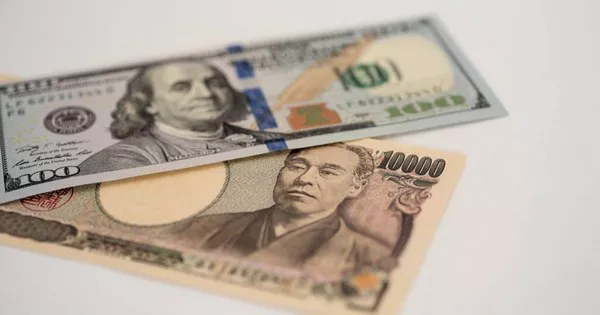The Japanese Yen (JPY) has been a notable currency in the global foreign exchange market for many years. However, in recent trading sessions, the JPY has seen a decline in its value. The reasons behind the fall of the Japanese Yen today are multifaceted and encompass various economic, political, and market-driven factors. In this article, we will explore and dissect the key factors influencing this decline.
Global Economic Conditions
One of the primary drivers behind the fall of the Japanese Yen today is the current state of the global economy. The world is experiencing significant economic challenges, with the aftermath of the COVID-19 pandemic still impacting markets and economies. Japan, like many other countries, has been grappling with economic uncertainty, and this has weighed heavily on the JPY.
The pandemic led to a contraction in global trade and a slowdown in economic activities, which affected Japan’s export-reliant economy. As a result, the demand for the Japanese Yen, often considered a safe-haven currency during times of uncertainty, waned. Investors sought higher returns in other currencies and assets, resulting in a decrease in demand for JPY and a subsequent fall in its value.
Monetary Policy
Another crucial factor contributing to the decline of the Japanese Yen is the monetary policy pursued by the Bank of Japan (BoJ). For years, the BoJ has maintained a policy of ultra-low interest rates and aggressive monetary easing measures, such as quantitative and qualitative monetary easing (QQE). These policies were designed to stimulate economic growth, combat deflation, and weaken the Yen to make Japanese exports more competitive.
However, these policies, while initially effective, have led to several consequences that are impacting the JPY. Low interest rates make the Yen less attractive to foreign investors seeking higher yields in other currencies. The persistent easing has also raised concerns about the sustainability of Japan’s fiscal policy, contributing to a decline in investor confidence.
Inflation Expectations
In recent times, Japan has been struggling to generate inflation, which has long been a goal of the government and the BoJ. While low inflation can be seen as a positive for consumers, it can have detrimental effects on the currency’s value. The lack of inflation erodes the purchasing power of the Yen, making it less appealing for investors.
To boost inflation expectations and stimulate economic growth, the Japanese government and the BoJ have embarked on various policies, including fiscal stimulus packages and ongoing monetary easing. However, the effectiveness of these measures remains a point of debate, as Japan’s deflationary pressures persist, contributing to the fall of the Japanese Yen.
Trade Balance
Japan’s trade balance, particularly its exports and imports, plays a significant role in the value of the Japanese Yen. A trade surplus, where a country exports more than it imports, can bolster its currency as foreign buyers acquire the country’s currency to facilitate trade. Conversely, a trade deficit can put pressure on the currency as the country needs to purchase more foreign currency to cover its import bills.
In recent years, Japan has faced trade challenges, partly due to the global economic conditions, as mentioned earlier. The JPY’s strength can adversely affect the nation’s exports, as it makes Japanese goods and services more expensive for international buyers. This, in turn, has contributed to a decline in the Yen’s value as Japan’s trade balance weakened.
Geopolitical Factors
Geopolitical factors, such as tensions between Japan and its neighboring countries, can also influence the value of the Japanese Yen. Political instability and conflicts can lead to fluctuations in currency values, as investors seek safe havens or flee from perceived risks.
In recent times, disputes over territorial boundaries and other geopolitical issues in the Asia-Pacific region have added uncertainty to Japan’s economic and political landscape. This instability can lead to a decreased appetite for the Yen, leading to a fall in its value.
Market Sentiment
Market sentiment, often driven by speculative trading and investor perceptions, can play a pivotal role in currency fluctuations. Traders and investors frequently react to news and events, leading to rapid changes in currency values. If the market sentiment is bearish on the Japanese Yen, it can lead to a sell-off, driving down its value.
In the age of 24/7 news cycles and high-frequency trading, market sentiment can change swiftly. Recent events, such as economic data releases, political developments, or geopolitical tensions, can create a shift in market sentiment, impacting the JPY’s value.
Divergence in Monetary Policies
The value of a currency can also be influenced by the divergence in monetary policies between different central banks. For instance, if the U.S. Federal Reserve raises interest rates while the Bank of Japan keeps rates low, the interest rate differential can lead to capital outflows from Japan into higher-yielding assets in the United States.
This divergence in monetary policies can create a fundamental shift in investor sentiment, causing a weakening of the Japanese Yen. As the U.S. dollar strengthens due to higher interest rates, it can put downward pressure on the JPY, further contributing to its decline.
Conclusion
The fall of the Japanese Yen today is the result of a complex interplay of factors, including global economic conditions, monetary policy, inflation expectations, trade balances, geopolitical issues, market sentiment, and divergence in monetary policies. It is crucial to understand that currency movements are influenced by a multitude of factors, and it can be challenging to pinpoint a single cause for a decline.
For traders, investors, and policymakers, staying informed about these factors and their potential impacts on the Japanese Yen is essential for making informed decisions in the foreign exchange market. Additionally, the Japanese government and the Bank of Japan will continue to monitor these factors closely as they work to maintain the stability and strength of the JPY in the global market.


